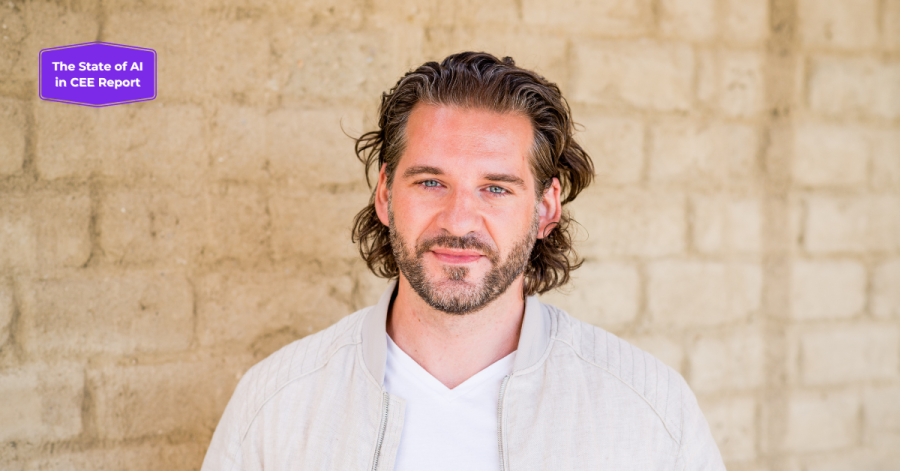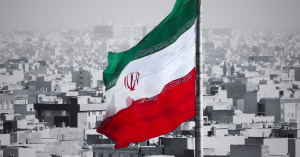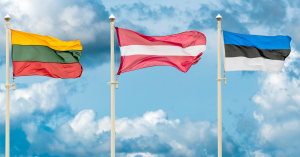Kaloyan Ratchev is the founder of Vangavis, a European innovation company focussing on the key topics and industries that will shape the future of our society. Kaloyan is a founding board member of the Bulgarian Artificial Intelligence Cluster as well as a board member of the European AI Forum. He holds a Master’s degree in Sociology and Economics from the University of Economics in Vienna and has been working in the field of innovation and entrepreneurship for the last 15 years.
The Recursive spoke to Kaloyan Ratchev about the European AI Forum’s commitment to bridging gaps, supporting diverse ecosystems, and influencing AI policy, while addressing the challenges and potential of AI innovation in the CEE region, aiming to foster collaboration, awareness, and regulatory guidance within the European AI landscape.
The following interview was conducted as a part of The Recursive’s “State of AI in CEE” report. Download the full report with insights from 40+ experts and an analysis of 900 AI product companies from CEE here.
The Recursive: How does the European AI Forum contribute to the advancement of AI in the CEE region and globally?
Kaloyan Ratchev: Our members from CEE include AI Cluster Bulgaria, CroAI, the Artificial Intelligence Association Croatia, AI Poland, AI4Si Slovenia, and the Artificial Intelligence Association of Lithuania. That means we have 5 out of 9 member countries from CEE. This is a significant representation. Together with our Western friends from France, Germany, Austria, and the Netherlands, we have a strong founders group. We always try to keep a good balance of knowledge and information transfer, exchange best practices, and support each other and our ecosystems.
We are one of the few AI organizations with such a diverse membership structure and so many members from CEE. On the one hand, each organization has its own structure and activities on a national level, all of them are very active in many areas of AI, from supporting national governments with AI expertise and implementing national AI strategies to community projects, education, awareness activities, and more.
On the EAIF level, we collect and communicate “the voice of AI in CEE” to the European authorities, we connect stakeholders and organizations from CEE with partners from our Western friends, we break down and “translate” EU AI regulation for the national AI communities, our members and the general public. In the future, we plan to have our annual conferences in CEE countries, so they can get even more of the hype and the ecosystems and their stakeholders get even more connected.
What are the European AI Forum’s future plans for AI-related initiatives and projects?
Although the EAIF has existed as an informal network since 2021, we established our Brussels-based organization just a couple of months ago.
Currently, we are designing our project roadmap. One of our major goals is to strengthen and support the European AI ecosystem – with a focus on European AI startups and corporations. We aim to strengthen the collaboration between those two types of stakeholders.
Education and Awareness are two of our major priorities. Other activities are related to the knowledge transition and information exchange between the EC and the national ecosystems (in both directions). As AI is a horizontal technology and we touch almost every industry, we connect more and more with other European organizations like ADRA, EIC, EIT, HADEA, Europa Bio, and other similar multiplicators and umbrella organizations.
Last but not least we will keep organizing our EAIF conferences, which turn out to be very successful, some of them with more than 10k viewers on YouTube, which is remarkable regarding the dry topics of AI regulation and policy.
Our main goals and objectives can be summarized as follows:
- Building upon and strengthening the connections between startups, companies, researchers, and other relevant participants in the field of AI in Europe to their mutual benefit and for promoting entrepreneurship in AI.
- Contributing to the development of an innovation-friendly, human-centric, trustworthy, and competitive framework for AI-made Europe.
- Raising awareness for the potential of AI, also in the general public and among citizens, and supporting education, knowledge, and openness towards AI technologies, also as a European Innovation Hub.
How would you describe the current state of AI innovation in the CEE region? How do you envision the near future of AI in the CEE region in the next 5 years?
Personally, I have mixed feelings about the development of AI innovation in CEE. We can see a very good development in terms of ecosystem growth in CEE, some flagship projects, and success stories.
We also have to be realistic. Still, the gap between different countries and regions in Europe is huge, and even bigger if you compare it on a global level to the US or China.
On the one hand, this is a question of resources, some countries just have more resources and are willing to invest them on AI-related topics. This task is for governments, banks, and VCs. It is also a question of markets, CEE consists of fragmented markets, rather small countries with a lot of languages, which does not make it easier.
It is also a cultural question. Corporate-startup collaboration of CVC is not as developed in CEE as in Western countries. Technology Transfer and spinoffs are not as developed as in Western countries. But as a national AI Cluster in Bulgaria as well as EAIF we work on these topics and expect positive developments.
What I also see is the image of the CEE is not that positive and the self-esteem of the founders seems to be low. Innovation that is developed in CEE does not really stay in CEE. In order to get the proper investment or market trust, startups need to open up a company and transfer the IP to a Western country like the UK or the US. A lot of the “CEE VCs” are legally also not located in the CEE countries, even though they operate here.
Governments do not support the AI ecosystem as they could and should, and if they do it is because of a lot of pressure and PR from the AI ecosystem.
On the other hand, we have a lot of talent and creativity in the CEE countries. The Baltic countries gained popularity and success stories. In Bulgaria, we have some good developments with the INSAIT institute and the Spinoff initiative of AI Bulgaria. In Poland, Croatia, and Slovenia the AI ecosystem is very active, also because of the AI associations, the members of the EAIF. There will be AI and Deep Tech unicorns as well as success stories from CEE, but maybe not at that speed and volume as elsewhere in Europe or the world.
In the future AI will move from a vertical to a horizontal topic and technology and it will be included in a lot of other verticals like fintech, biotech, agriculture, creative industries, and more. It will become a seamless technology and that might also bring positive effects to CEE.
How does the European AI Forum plan to influence the EU’s AI regulatory framework? And in what ways has the European AI Forum already contributed to the discussions around AI regulations in the EU?
We provide feedback to the EC in different forms like position papers, we take part in expert round tables in Brussels, and we support our national governments with the AI strategy. We are also in constant exchange with our national AI ecosystems and collect their opinions and feedback which we then provide to the EC in a structured way. So here we take the role of a connector and translator between the EC and the national AI ecosystems. As an umbrella organization, we are in constant communication with EU authorities and single representatives. We can name Kilian Gross or Eva Maydell and her team here, but also others of course.
With our EAIF events, we also provide a stage for EC stakeholders to present their position regarding EU AI regulation. One of our main activities until now was connected to EU regulation. We had almost the whole EU elite as speakers at our events, from Mariya Gabriel to Margarethe Verstager, Maroš Šefčović, Virginijus Sinkevičius and many more.
As we will soon enter a phase of “life after the AI Act”, the tasks will move more in the direction of implementation, education, and operational management. It will need effort in order to bring the AI Act to single national ecosystems and companies. I suppose we will work more on sandboxes, we will have to provide legal expertise and advice to the companies. We see that developments like the AI PACT occur, so there will always be something to work on.








